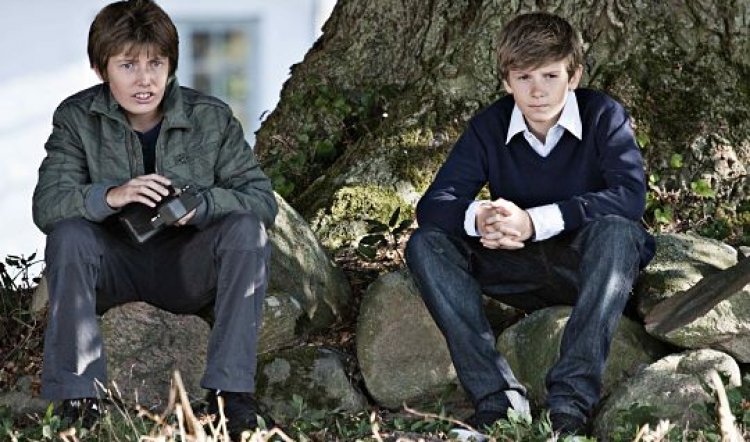
IN A BETTER WORLD
IN A BETTER WORLD, directed by Susanne Bier; starring Mikael Persbrandt, Trine Dyrholm, Markus Rygaard, William Johnk Nielsen; 1hr.59m, Rated: MA
We’ve had some very unpleasant behaviour shoved in our faces recently after the YouTube video of the schoolyard bullying in Sydney went viral and sparked not just local, but international debate. And the aggro little bully at the heart of the matter was by no means the only person behaving badly – as repellent as he was in his starring role in the video, and as slippery with the truth as he turned out to be when he was encouraged to defend himself in the aftermath.
There were also the shock jocks who happily fuelled the flames of the “got what he deserved” debate; the angry callers lining up to congratulate the bigger boy who responded to being bullied by violently bodyslamming his smaller tormentor to the ground; the media that turned the brawling boys into TV stars on commercial current affairs, paying their families large amounts of money to argue that their boys hadn’t done anything all that unreasonable – neither the one whose ugly taunts sparked the incident, nor the bigger boy who was instantly lionised in the media for retaliating – though he may not have been had the smaller boy been maimed or killed when he hit the ground.
Radio callers, even on the more genteel ABC, applauded the bullied boy’s fightback, and even took a poke at guest Michael Carr-Gregg, the adolescent psychologist expressing concerns to host Adam Spencer about the elevation of the fightback boy to hero status. It was sending the wrong message to kids about how to handle bullying and solve conflicts in general, he said. One caller sneered at Carr-Greg’s “pacificism”. “First you tell ’em ‘stop it or I’ll hit you’,” he counselled, “that’s what I’ve been telling my son.” After that, “if they keep going, you flatten ’em. Simple!” Others joined the chorus. Carr-Gregg wasn’t impressed.“Let’s all surrender to anarchy then shall we,” he said.
Ironically, he later took a pasting on the same station for being offensive when he said he was shocked by the caller’s “antediluvian, troglodyte view” and that “it’s just moronic to say hit back – when you hit back and a kid falls over and bangs his head and is either dead or brain dead it’s not a very clever solution.” The point being made about “that’s what we’ve always done” seemed to be lost. We used to torture unbelievers too, burn witches at the stake, use the lash on petty miscreants, execute criminals, force small children to sweep chimneys and work in factories. Carr-Greg was trying to make an argument for the civilising influence of teaching a better way, but the stroppy callers didn’t want to know. An eye for an eye was the prevailing wisdom.
In the midst of the antagonistic biffo of that public debate, Susanne Bier’s Academy Award winning film In a Better World arrived like balm to the soul. That the arts – as grudgingly supported as they are – have a huge role to play in fostering a creative approach to problem solving is never in doubt. But it’s always exciting – and in this case perfect timing – to be reminded how powerful storytelling can be in providing an accessible way into the complex moral questions that bedevil us.

In a story that criss-crosses the world between the privilege of a beautiful Danish seaside town and the day to day horrors of a Somalian refugee camp, the film travels between the parallel worlds of schoolyard bullying and the grownups’ version that sees violence, retaliation and its appalling human cost featuring nightly on the news. Tracking between the kids and the adults, all grappling in different ways with injustice and the seductive appeal of vengeance, this quietly powerful narrative offers – indeed urges upon us – a thoughtful and nuanced consideration of important questions that go directly to who we are, yet are so often reduced to sensationalised point-making in the media.
The story begins in Somalia where a Danish doctor (Mikael Persbrandt) is trying to make a difference as part of a small international outpost bringing medical services to deprived people in a desolate place. His personal brief is to give aid to all, but his concern about the violence inflicted on the refugees by the vicious local “big man” comes to a head when he faces repeated evidence that young girls coming in with appalling injuries have been impregnated and then cut open so the big man can run bets on the sex of the unborn children.
In between visits home he keeps in regular contact with his son Elias (Markus Rygaard), who’s badly missing his father and afraid his parents’ separation will become permanent. Things turn problematic when Elias forms a friendship with Christian (William Johnk Nielsen), a new boy in town whose self-possession masks a seething fury with his father and the world at large in the wake of his mother’s death from cancer. Christian needs a hook to hang his anger on (the Danish title of this film Haevnen, means literally revenge) and the opportunity arises when Elias is bullied at school. Soon afterwards Elias’s father, home for a break from Somalia, is hit by a stranger when he breaks up a squabble between two small children in a park. Elias’s dad refuses to retaliate, explaining his reasons to the boys, but Elias is ashamed and Christian, we know, is warming to his badly skewed commitment to justice, whatever the cost.
Played out with real grace by a cast gifted with a perceptive script by Anders Thomas Jensen (who also wrote Bier’s previous films Brothers and After the Wedding), the film takes the questions raised by the cranky Sydney talkback callers venting their anger about bullying into a real setting. And the aspirations of the Michael Carr-Greggs of this world as well. What can we do in the face of injustice? How far can we go to right a wrong? When does the end justify the means? Is becoming a monster the way to deal with a monster? How do we break the cycle? There are no easy answers. Bier’s story simply says – with great conviction – that the solutions are worth pushing for. And the heart and hope with which she invests the story make it both moving and memorable.



